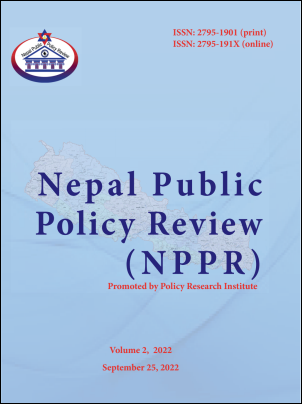हाम्रो निर्वाचन प्रणाली र सुधारका सम्भावनाहरू {Our electoral system and prospects for reform}
Keywords:
निर्वाचन प्रणाली, प्रथम हुने निर्वाचित, प्रथम हुने निर्वाचित हुने प्रणाली, समानुपातिक प्रतिनिधि, मिश्रित लोकतन्त्रको विकासAbstract
निर्वाचन प्रणाली लोकतन्त्रको आधार स्तम्भ हो l निर्वाचनको आवधिक अभ्यासमार्फत नागरिकले सार्वभौम अधिकारको प्रयोग गर्ने अवसर प्राप्त गर्छन्, संवैधानिक विकासले गतिशीलता प्राप्त गर्दछ र मुलुकको शासनले वैधानिकता प्राप्त गर्दछ । आवधिक निर्वाचनको अभ्यासबाट लोकतन्त्र जीवन्त हुन्छ । यस अर्थमा निर्वाचन लोकतन्त्रको प्राण वायु हो । विश्वमा विभिन्न प्रकृतिका निर्वाचन प्रणाली पाइन्छन् तापनि तिनले अङ्गीकार गरेका सारतत्व र आधारभूत मान्यता शाश्वत र विश्वव्यापी प्रकृतिका छन् l सम्बन्धित मुलुकको संवैधानिक संरचना, राजनैतिक शक्ति सन्तुलन र ऐतिहासिक परम्परा अनुसार विकसित हुने भए पनि आम रूपमा निर्वाचन प्रणालीहरू तीन प्रकारका पाइन्छन् - पहिलो हुने निर्वाचित हुने प्रणाली, समानुपातिक प्रतिनिधित्वको प्रणाली तथा मिश्रित प्रणाली । नेपालमा अन्तरिम संविधानबमोजिम गठन भएको संविधान सभाको प्रयोजनका लागि तत्काल कायम रहेको द्वन्द्व व्यवस्थापन तथा मुलुकका सबै जात, जाति, समुदायको प्रतिनिधित्व सुनिश्चित गर्न समानुपातिक प्रतिनिधित्वलाई बढी भार दिई समानुपातिक प्रतिनिधित्व र पहिलो हुने निर्वाचित हुने समानान्तर मिश्रित निर्वाचन प्रणाली अपनाइएको थियो । त्यस यता, नेपालले अपनाएको निर्वाचन प्रणाली आफ्नै विशिष्टतासहितको मिश्रित छ । यो सैद्धान्तिक रूपमा सरल देखिन्छ l तर कानुनी, प्रक्रियागत, मत भार तथा क्लष्टर व्यवस्थापनको दृष्टिले अत्यन्त जटिल झन्झटिलो छ । यो प्रणालीअन्तर्गत सबै तह र संरचनाको पहिलो निर्वाचन सम्पन्न भई स्थानीय तहको दोस्रो कार्यकालका लागि पनि निर्वाचन भइसकेको छ l अन्य जनप्रतिनिधि संस्थाको निर्वाचन हुने अवस्था छ । यो अवधिमा निर्वाचन प्रणालीका सबल पक्ष र कमजोर पक्षको पहिचान भइसकेको छ l सुधार गर्नुपर्ने विषय स्पष्ट भएका छन् । यो सिकाइ र अनुभवको आधारमा निर्वाचन प्रणालीको नियमित सुधार गर्नु प्रत्येक लोकतान्त्रिक मुलुकको राष्ट्रिय एजेन्डा हुनु पर्दछ ।
Abstract in English An electoral system is the foundation of democracy. Its periodic exercise enables citizens to realize their sovereign rights, enhances the legitimacy of governance and helps democracy to remain healthy from within. The design of a country’s electoral system depends on its constitutional arrangement, political power balance and historical tradition. It is also expected to embrace certain norms being practised universally. Among prominent electoral systems in the world are the first-past-the- post system, the proportional representation system and the mixed electoral system. Nepal has pursued the mixed electoral system, which in principle is simple and straight. However, it is very complex in terms of legal and procedural management. Following the completion of a round of elections to all levels and structures, the second round of local elections has also been completed. Preparations are on for the election to other representative bodies, including the Federal Parliament. In the process, electoral authorities have come across ample evidence of what works, what does not and where changes are needed. These lessons and experiences should drive the periodic reform of the electoral system in order to reinvigorate the democratic exercise.
Downloads
Downloads
Published
How to Cite
Issue
Section
License
Copyright (c) 2022 Madhav Paudel

This work is licensed under a Creative Commons Attribution-NonCommercial 4.0 International License.




